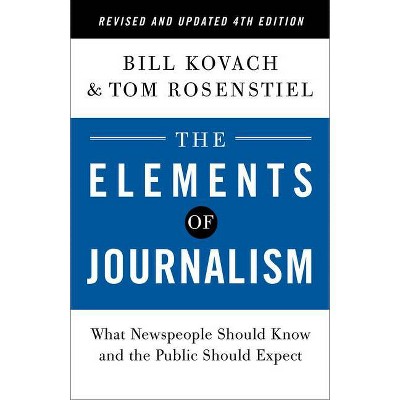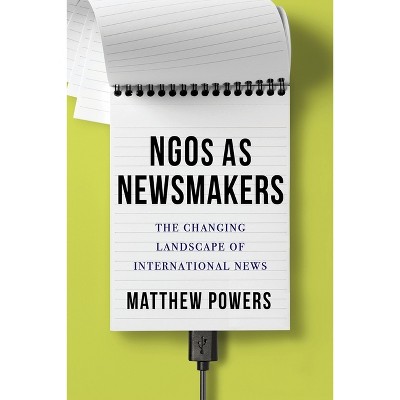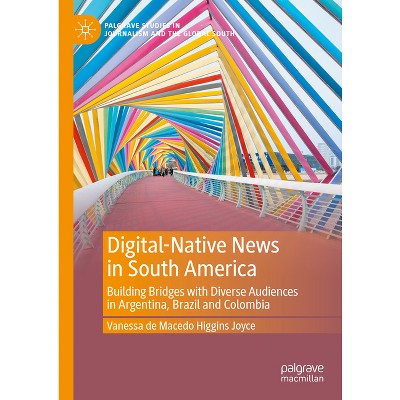About this item
Highlights
- This current and comprehensive overview of global media developments discusses key concepts like freedom, journalism ethics and education, news cultures, and international news flow.
- About the Author: Daniela V. Dimitrova is professor in the Greenlee School of Journalism and Communication at Iowa State University and editor-in-chief of Journalism and Mass Communication Quarterly, the flagship journal of AEJMC.
- 258 Pages
- Language + Art + Disciplines, Communication Studies
Description
About the Book
This current and comprehensive overview of global media developments discusses key concepts like freedom, journalism ethics and education, news cultures, and international news flow. With timely case studies, the book offers a foundation for today's journalism students learnin...Book Synopsis
This current and comprehensive overview of global media developments discusses key concepts like freedom, journalism ethics and education, news cultures, and international news flow. With timely case studies, the book offers a foundation for today's journalism students learning about the practice, growth, and impact of global journalism.
Review Quotes
A robust and breath-taking look at global journalism practices, this book showcases diverse views from more than 20 global media experts from 12 different countries unpacking pivotal issues snatched from today's headlines. Topics range from the refugee crisis, press freedom to journalism culture, and media ethics. Scholars and students alike benefit from this panorama rooted in the classical theories but fresh with new ideas and insights. Excellent as a textbook it belongs on every global news scholar's shelf.
Admirably global in its reach and approach, Daniela Dimitrova has put together an excellent collection of essays which should be essential reading for students and researchers interested in journalism and its globalization.
At last, here is a global journalism textbook that accounts for the worldwide ascendance of digital platforms and the spread of populism and authoritarianism. What a fantastic collection!
Global Journalism is an exceptional volume, offering both a broad scope and nuanced detail. It takes digitalization seriously and fundamentally revisits how to think about global journalism in the digital age. It promises to set the agenda for the field by highlighting key themes while also exploring overlooked but important topics.
Global Journalism is the textbook global communication scholars have been waiting for.
Its truly global approach, clear-cut language, success placing complex processes into non-judgmental context, and seventeen well-chosen, comprehensive chapters makes it an ideal text for upper-level undergrads and grad students alike.
In this era beset by misinformation, quality journalism has never been more important. Dimitrova and colleagues convincingly show that there is more than one definition of quality and more than one way to achieve it. This cosmopolitan compendium will open some eyes!
It's not easy to capture the rich diversity of contexts in which journalism exists. This book does so brilliantly, providing an accessible, up-to-date and truly global analysis of the key questions and issues that confront journalism at a time of fundamental transformations. It is a must-read for anyone who wants to gain a better understanding of journalistic cultures and practices.
It's widely acknowledged that finding journalism books that truly take an international focus has long been a remarkable challenge. Thanks to extensive and innovative dispatches masterfully put together by Daniela Dimitrova, this book is to become the go-to volume for anyone interested in theoretical, methodological and epistemological developments in international journalism or broadly, international communication. The editor has the world-leading, sought-after track-record to speak about these issues.
One of the key challenges for journalism research is to identify, map and articulate issues that cut across national boundaries while keeping our eye on local particulars. This book provides an essential roadmap for navigating such a truly global journalism studies.
The book provides an overview of selected discourses in international journalism research and offers insights into central characteristics of media systems worldwide, and thus complements the corpus of introductory literature quite usefully
The new and more nuanced media model that the book offers relies on synthetizing various media theories and empirical data, which can hopefully help researchers to understand more about the peculiarities of the world's media systems. At the end of each chapter the authors set questions based on their studies, which clearly indicates that this book is not only a textbook for scholars and researchers but it is also an object to trigger the critical thinking of students learning about global journalism and media systems.
There is no one work that provides the breadth and depth of understanding the technological changes and their impact on all aspects of global journalism as Dimitrova does here. Global Journalism generates a fresh and complex view of timely case studies and theoretical models featured by contributors from 12 different countries. This book will arouse interest and provide a scholarly foundation for understanding world media systems and key issues facing international communication today.
This excellent volume provides a comprehensive, state-of-the-world examination of global journalism's practices and characteristics. An explication of key concepts and topics is combined with more context-specific perspectives from all regions of the world to provide a multi-perspectival view.
This inspiring book takes the reader on a world tour of journalism practices, touching on theories and current issues that describe, explain and predict the evolution of global journalism cultures from the local perspective. It is a must-read for journalism students in higher education.
While conceptions of "global journalism" may be relatively new, journalism has long been globalising in its ambitions to forge communicative networks across national borders. This excellent volume disrupts Western, ethnocentric assumptions in media research, its impressive range of chapters affording important insights into questions of power, influence and social change recurrently denied the attention they deserve. Highly recommended for scholars, students and journalists alike.
About the Author
Daniela V. Dimitrova is professor in the Greenlee School of Journalism and Communication at Iowa State University and editor-in-chief of Journalism and Mass Communication Quarterly, the flagship journal of AEJMC. As an established media scholar, Dimitrova has published peer-reviewed research articles in the areas of global journalism and political communication in leading journals such as Communication Research, Press/Politics, New Media & Society, andthe European Journal of Communication. She is the recipient of multiple awards, including AEJMC Senior Scholar and LAS International Service Award, and grants from the International Research Exchange Board and the Page Center for Integrity in Public Communication.











